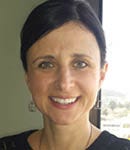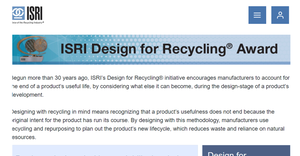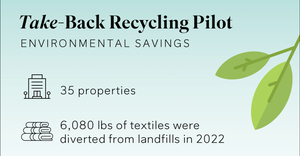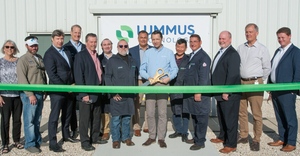Julie Bryant, senior zero waste coordinator for the City and County of San Francisco, talks about the challenges that come with trying to achieve zero waste.
Julie Bryant, senior zero waste coordinator for the City and County of San Francisco, is helping San Francisco work toward its zero waste goals by designing, implementing and evaluating zero waste programs and outreach for all 25,000 San Francisco government employees at 1,000 facilities.
Within her role, she helps administer the city’s refuse contract, develop local zero waste legislation and manage various aspects of green procurement. In addition to those duties, she is an active member of the California Resource Recovery Association, the Northern California Recycling Association and the U.S. Composting Council.
Earlier this year, Waste360 awarded Bryant with a Waste360 40 Under 40 award for her strong contributions to the waste and recycling industry. And we recently spoke with her about her experience working with the Peace Corps, the challenges that come with trying to achieve zero waste and her advice for those looking to have a career in the waste and recycling industry.
Waste360: How did you land your first role in the waste and recycling industry?
 Julie Bryant: In college, I had an internship at a small organization called the Community Environmental Council in Santa Barbara, Calif., which actually had implemented the city’s first curbside recycling program prior to me interning there. The Community Environmental Council was taken over by the city before I joined the staff, and the city actually runs the collection services.
Julie Bryant: In college, I had an internship at a small organization called the Community Environmental Council in Santa Barbara, Calif., which actually had implemented the city’s first curbside recycling program prior to me interning there. The Community Environmental Council was taken over by the city before I joined the staff, and the city actually runs the collection services.
While I was there, I helped manage the household hazardous waste collection facility in Santa Barbara County. I was doing simple tasks like making appointments for customers to bring in their used paint and other hazardous items. Throughout the duration of my internship, I got to understand a little bit more about how the world of managing household hazardous waste worked, and I was eventually offered a full-time job after college. I managed the used oil collection program for about a year before I decided to move back to the Bay Area and to seek other opportunities.
Shortly after moving back to the Bay Area, I took a job with the City and County of San Francisco doing toxic reduction work. I mainly focused on understanding the toxicity usage of the products that were used and how to properly dispose of them.
I stayed in that role for a while before applying internally to become part of the zero waste program team. Since joining the zero waste program team, I have helped design and implement programs and policies focused on recycling, composting, green purchasing and waste prevention.
Waste360: You spent some time working with the Peace Corps. Tell us about that experience.
Julie Bryant: It was one of the best experiences I have ever had. I went to Benin, a small country in West Africa, for about two and a half years to help one of its largest cities improve its waste management. As you can imagine, waste management over there looks completely different, and most people pile up their trash in their backyard and burn the pile once it gets large enough.
The small businesses that try to collect the waste from homes have very few customers because most residents can’t afford the cost of the services. And the waste the businesses do collect is taken to a “landfill,” which is really just a designated area to place waste away from homes. I worked hand-in-hand with these 12 businesses to help them gain more business by improving their marketing strategies. I also worked with municipalities to help make their waste and recycling efforts more efficient.
In Benin, waste management is really a health issue more than anything. While it’s both an environmental issue and a health issue, the residents really understand that burning materials like plastic is very bad for their health and that moving that material away from their homes is safer than keeping it there.
In addition to those efforts, I worked with a small women’s group on the concept of composting. Almost everything that is thrown away in that country is compostable, and my goal was to really help that group of women become more efficient with their composting efforts so they could continue to flourish.
Waste360: Provide us with a brief overview of your role as senior zero waste coordinator.
Julie Bryant: Within our zero waste program, we have three coordinators who manage the sectors of residential, commercial and government. I work in the government sector, which actually makes up about 17 percent of the waste stream that we manage. San Francisco has a large government sector because we are both a city and a county.
One of the biggest challenges of my role is understanding the wide variety of materials that the government sector generates, such as office materials, street sweeping materials, public litter can materials, etc. I work closely with the different areas of the government to ensure that those materials are composted and recycled whenever possible.
When I first started working with the zero waste program, San Francisco didn’t really have composting. But now we offer composting at a lot of different government facility locations and we offer recycling in every government facility. With those efforts, we try to lead an example for San Francisco by showing our communities that the government is serious about helping us achieve zero waste.
Additionally, I co-manage our green purchasing program. With that program, we have a large purchasing contract with the government of San Francisco, which allows us to purchase large amounts of computers, paper towels, toilet paper, etc. Part of my role with that is to research products to make sure that we are using the most environmentally friendly products available, such as compostable bags and recyclable items.
Lastly, I work with the board of supervisors and state legislators to implement and create policies. I also oppose policies that may potentially hurt San Francisco environmentally. Our goal is to pass policies that make sense, both economically and environmentally.
Waste360: What goals are you working toward going into 2017?
Julie Bryant: In San Francisco, we have a unique system when it comes to waste management. We don’t have a franchise agreement or a bidding process for most of our refuse services, including commercial and residential. However, we do have a contract with a hauler for our government refuse services, which I write, manage and administer.
In 1932, a law was passed by voters that essentially gives Recology an exclusive, long-term permit to provide services to almost everyone in the city. In order to regulate those services, we go through a year-long legal process every three-to-six years to help determine the residential and commercial refuse rates for the city.
Going into 2017, I will be working on that legal process and going through Recology’s financial statements to understand what the hauler is proposing and if those rates make sense or not.
Waste360: What are some of the challenges that come with trying to achieve zero waste?
Julie Bryant: In San Francisco, the city itself is changing very rapidly. We are currently going through a construction boom, and a lot of people are moving here for various reasons. The population and demographic of the city are changing quickly, and it is part of my job to make sure that we are teaching every single one of our residents to do the right thing. That task, however, is not always easy, especially when changes are happening at such a quick pace.
The construction boom is also causing landfilling to increase for the first time in about 30 years. The last time we went through a boom and bust, we saw landfilling decreasing and recycling and composting increasing. But with this current boom, we are seeing flat lining of recycling and composting and a spike in landfilling. Things are going in the wrong direction, and we are hoping to reverse that trend. It takes a real herculean effort to improve those numbers, but we are doing everything we can to make that happen.
Waste360: What advice do you have for those looking to start a career in the waste and recycling sector?
Julie Bryant: I cannot overestimate the importance of relationships. I wish I had taken more advantage of speaking to those around me when I was younger. I also wish I would have done more informational interviews to learn about the industry and about the different roles that the industry has available.
I would tell those looking to work in this industry to not be afraid to strike up a conversation with someone new and to not be afraid to attend conferences and mingle. I have always had a hard time doing that, but I wish I would have forced myself to do it more because I didn’t realize how important it was to network at the time.
Throughout the duration of my time in the industry, learning from people has been my biggest learning experience. There is truly no better way to learn about the industry than to connect and learn from those who currently work in it.
About the Author(s)
You May Also Like




